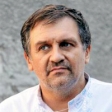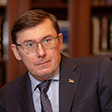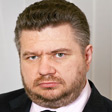"Комплекс Льовенталя": що чекає нас і над чим починають задумуватися на Заході
Тиждень тому Микола Рябчук написав блискучу колонку під назвою "Комплекс Льовенталя": "У романі Кетрін Енн Портер "Корабель дурнів" є персонаж на прізвище Льовенталь – єврейський комерсант, котрий відмовляється еміґрувати з Німеччини, попри дедалі відчутнішу нацистську загрозу. "Це наша батьківщина, – каже він. – Зрештою, нас тут майже мільйон. Куди вони нас подінуть? Повбивають, чи що?"
Нещодавно я відбув подібну подорож із подібними персонажами – тільки не кораблем, а поїздом. Мої сусіди – освічені галичани – цілу дорогу переконували мене, що нічого страшного в Україні не сталося, що Табачник – це ще не вся Партія реґіонів, що є там персонажі й менш україножерчі, а головне – переживши Кучму, переживемо, мовляв, і його перевтілення у вигляді Януковича".
Переказувати далі не буду, матеріал є на сайті "Газети по-українськи". Але тиждень, що минув, показав, що загрозливі тенденції не послабились. Вчора стаття під красномовною назвою "Ukraine's Democracy in Danger" надрукована і у Wall Street Journal. Напередодні візиту до США Януковичу і його команді буде над чим подумати.
Український переклад з'явився на "Главреді". Англомовний оригінал тут:
Wall Street Journal Europe, March 30, 2010
Ukraine's Democracy in Danger
Viktor Yanukovych's misrule is courting a second 'Orange Revolution.'
By Alexander J. Motyl
As Ukraine's recently elected President Viktor Yanukovych prepares to
visit Washington in April, he will aim to project an image of stability,
confidence, and control. In reality, Mr. Yanukovych has committed a series
of mistakes that could doom his presidency, scare off foreign investors,
and thwart the country's modernization.
Mr. Yanukovych's first mistake was to violate the constitution by changing
the rules according to which ruling parliamentary coalitions are formed,
making it possible for his party to take the lead in partnership with
several others, including the Communists. That move immediately galvanized
the demoralized opposition that clustered around his challenger in the
presidential elections, former Prime Minister Yulia Tymoshenko.
His second mistake was to appoint as prime minister his crony Mykola
Azarov, a tough bureaucrat whose name is synonymous with government
corruption, ruinous taxation rates, and hostility to small business. The
appointment dispelled any hopes Ukrainians had that Mr. Yanukovych would
promote serious economic reform.
His third mistake was to agree to a cabinet consisting of 29 ministers as
opposed to 25 before-an impossibly large number that will only compound
its inability to engage in serious decision making. That the cabinet
contained not one woman-Mr. Azarov claimed that reform was not women's
work-only reinforced the image of the cabinet as a dysfunctional boys'
club.
His fourth mistake was to appoint two nonentities-a former state farm
manager, and an economics graduate from a Soviet agricultural institute-to
head the ministries of economy and finance. Meanwhile, he created a
Committee on Economic Reform, consisting of 24 members, to develop a
strategy of economic change. The size of the committee guarantees that it
will be a talk shop, while the incompetence of the two ministers means
that whatever genuinely positive ideas the Committee develops will remain
on paper.
His fifth mistake was to appoint the controversial Dmytro Tabachnik as
minister of education. Mr. Tabachnik has expressed chauvinist views that
democratically inclined Ukrainians regard as deeply offensive to their
national dignity, such as the belief that west Ukrainians are not real
Ukrainians; endorsing the sanitized view of Soviet history propagated by
the Kremlin; and claiming that Ukrainian language and culture flourished
in Soviet times. Unsurprisingly, many Ukrainians have reacted in the same
way that African Americans would react to KKK head David Duke's
appointment to such a position-with countrywide student strikes,
petitions, and demonstrations directed as much at Mr. Yanukovych as at Mr.
Tabachnik.
These five mistakes have effectively undermined Mr. Yanukovych's
legitimacy within a few weeks of his inauguration. The 45.5% of the
electorate that voted against him now feels vindicated; the 10-20% that
voted for him as the lesser of two evils now suspect that their fears of
Mrs. Tymoshenko's authoritarian tendencies were grossly exaggerated. And
everyone worries that Mr. Yanukovych and his band of Donbas-based "dons"
are ruthlessly pursuing the same anti-democratic agenda that sparked the
Orange Revolution of 2004.
Several other key dismissals and appointments have only reinforced this
view. The director of the Security Service archives-a conscientious
scholar who permitted unrestricted public access to documentation
revealing Soviet crimes-has been fired. The National Television and Radio
Company has been placed in the hands of a lightweight entertainer expected
to toe the line. Most disturbing perhaps, several of Mr. Yanukovych's
anti-democratically inclined party allies have been placed in charge of
provincial ministries of internal affairs-positions that give them broad
scope to clamp down on the liberties of ordinary citizens.
Democratically inclined Ukrainians are increasingly persuaded that Mr.
Yanukovych wants to become Ukraine's version of Belarus's dictator,
Alexander Lukashenko. But Mr. Yanukovych's vision of strong-man rule rests
on a strategic, and possibly fatal, misunderstanding of Ukraine.
First, the Orange Revolution and five years of Viktor Yushchenko's
presidency empowered the Ukrainian population, endowing it with a
self-confidence that it lacked before 2004 and consolidating a vigorous
civil society consisting of professionals, intellectuals, students, and
businesspeople with no fear of the powers that be. Mr. Yanukovych's
efforts to establish strong-man rule already are, and will continue to be,
resisted and ridiculed by the general population.
Second, Ukraine's shambolic government apparatus cannot serve as the basis
of an effective authoritarian government. Tough talk alone will fail to
whip a bloated bureaucracy into shape. Worse, Ukraine's security service
and army are a far cry from those in Belarus. Mr. Yanukovych may try to
emulate Mr. Lukashenko, but without a strong bureaucracy and coercive
apparatus, he will fail.
Third, with an ineffective cabinet, all decision making will be
concentrated in Mr. Yanukovych's hands. Even if one ignores his deficient
education and poor grasp of facts, Mr. Yanukovych's appointment of Mr.
Tabachnik demonstrates that Ukraine's president is either completely out
of touch with his own country, or arrogantly indifferent to public
opinion.
Fourth, Ukraine is still in the throes of a deep economic crisis. If Mr.
Yanukovych does nothing to fix the economy, Ukraine may soon face default,
and mass discontent among his working class constituency in the southeast
is likely. If Mr. Yanukovych does embark on serious reforms, that same
constituency will suffer and strikes are certain. So negotiating the
crisis will require popular legitimacy-which Mr. Yanukovych is rapidly
squandering; a strong government-which he does not have; and excellent
judgment-which is also missing from the equation.
Indeed, if Mr. Yanukovych keeps on making anti-democratic mistakes, he
could very well provoke a second Orange Revolution. But this time the
demonstrators would consist of democrats, students, and workers. The
prospect of growing instability will do little to attract foreign
investors, while declining legitimacy, growing incompetence, and tub
thumping will fail to modernize Ukraine's industry, agriculture, and
education. Mr. Yanukovych could very well be an even greater failure as
president than Mr. Yushchenko.
Although the outlook is grim, it is not yet hopeless for Ukraine's new
president. He could still grasp a modest victory from the jaws of an
embarrassing defeat by ruling as the president, not of Donetsk, but of all
Ukraine. All he has to do is restrain his appetite for power and learn to
rule with the opposition and with the population. It's not so
complicated-it's democracy.
Mr. Motyl is a professor of political science at Rutgers University-Newark.
Блог автора – матеріал, який відображає винятково точку зору автора. Текст блогу не претендує на об'єктивність та всебічність висвітлення теми, яка у ньому піднімається. Редакція "Української правди" не відповідає за достовірність та тлумачення наведеної інформації і виконує винятково роль носія. Точка зору редакції УП може не збігатися з точкою зору автора блогу.







